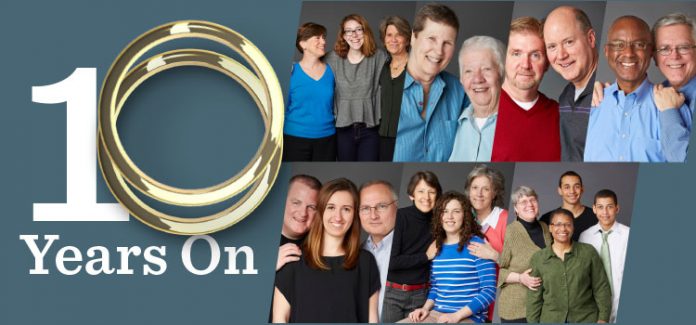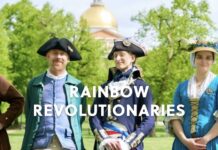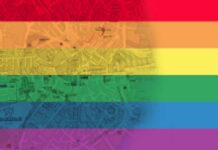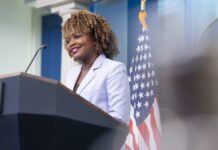[custom_field this_post=”1″ field=”Photographer” limit=”0″ before=”Photos by ” between=”, ” /]
The Goodridges famously split, but the other plaintiff couples remain together; here’s how happily ever after turns out a decade later
On May 17, 2004, history was made. Massachusetts became the first state in the country to honor legal same-sex marriages. And when one considers the ripple effect that had—catalyzing greater acceptance that permeated everything from pop culture to politics—it is no exaggeration to say that for gay men and women, America changed forever.
And it happened because of “Goodridge v. Dept. of Public Health,” the landmark court case argued by GLAD’s Mary Bonauto. Together, seven couples shared their lives with the world in the hopes that they might change it. And a decade later, we revisited each of them to reflect on the case, its impact, how it changed their lives.
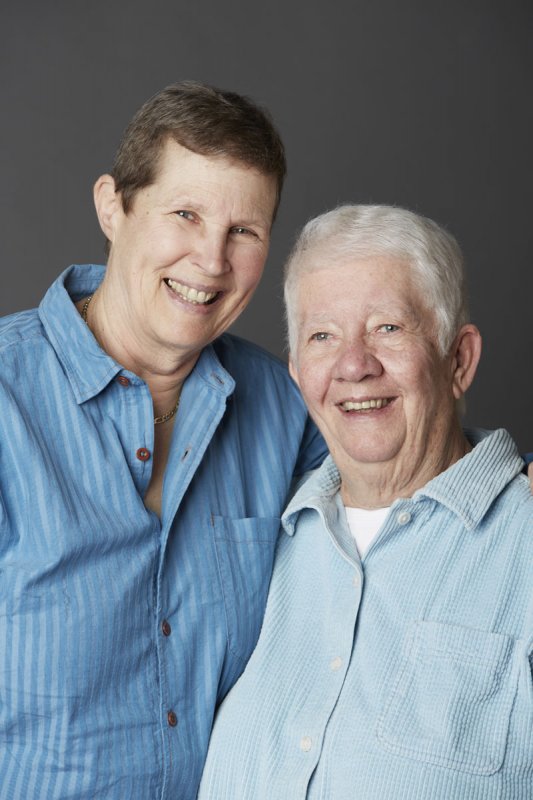
Linda and Gloria had two weddings. The first was in May 2004, before the cameras of the national press, as one of the seven “Goodridge” couples who ushered equal marriage to Massachusetts. The second ceremony was in July, reserved for an intimate group of family and friends.
But a decade later, they remain reminded constantly of the countless others out there—many of them perfect strangers—who continue to celebrate their union. “We still get cards and letters,” says Gloria. “Even invitations to the weddings of people we don’t even know!”
When they involved themselves in the Goodridge case, it was to fight for their rights. Linda and Gloria met in 1970. They had spent four decades dodging the blows of discrimination: always forced to explain (or not) their relationship, and frequently worrying what would happen to the other in the case of illness or emergency. And they sometimes had to battle the sense of self-doubt that emerges in a world that constantly assaults your identity. “I didn’t want to do it. I thought I was going to be sick,” recalls Linda of the morning in 2001 that they had to go to the Orleans town hall to request a marriage license. It was a necessary evil; they had to be denied a license in order to have a lawsuit. “I was scared to death,” she admits. “It was my own internalized homophobia.”
And there was already enough of that in the outside world. Gloria remembers preparing to stand outside a Catholic diocese that was having a “teach-in” to rally parishioners against gay marriage. Linda and Gloria were to be there outside, to put a human face to the issue. “I just broke down the night before,” says Gloria. “I didn’t know if I could go, and feel in the deepest part of my being that all these religious people were against me and against our love for one another. Something about that was a million times more painful than when all the politicians would speak.”
But they did go, and they weren’t alone. Members of their Unitarian Universalist Congregation joined them to show support, and to outweigh with love all car horns and middle fingers flung their way. “The anti-gay demonstrations were very real and very painful, but they were about five percent of what we experienced,” says Gloria now. “The other 95 percent was love and support. That made enduring the slings and arrows possible.”
They continue to feel that support today. It comes through the cards and invitations mailed to their home in Orleans—where Linda runs Rainbow Coaching, a personal and relationship coaching service. It comes through the hugs they receive on the street when someone recognizes them from an old TV interview, and thanks them for making their wedding possible. And it comes through the tangible progress of equal marriage, which has gone from one state’s ambitious goal to the reality of life in 17. “It makes me want to cry, to think how fast things are changing and how many people’s lives have been transformed,” says Gloria.
But more than 40 years after they first fell in love, their greatest source of support remains the same: each other. “We don’t just love each other, we like each other,” says Linda. “I married my best friend.”


